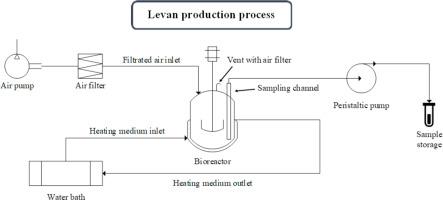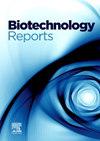Optimization of levan biosynthesis from Bacillus siamensis using batch and continuous stirred-tank bioreactors: A response surface methodology approach
Q1 Immunology and Microbiology
引用次数: 0
Abstract
Levan, a promising fructan polysaccharide for biopharmaceuticals, has limited large-scale production studies. This research optimized and scaled up levan biosynthesis from Bacillus siamensis in continuous stirred-tank bioreactors based on response surface methodology (RSM). Batch cultures optimized for 30 % (w/v) sucrose, pH 5.0, and 48 h incubation yielded a maximum 15.74 % (w/v) levan. The optimal batch conditions were evaluated in a continuous stirred-tank bioreactor, where dilution rates and mixing speeds were examined. At a dilution rate of 0.021 h⁻¹ and an agitation speed of 200 rpm, the maximum productivity was 17.96 % (w/v), and steady-state conditions were attained after three days of continuous fermentation. X-ray diffraction confirmed the amorphous nature of the levan, ideal for biomaterial applications. These results underline the potential of B. siamensis for high-yield levan production and provide a systematic approach for bioprocess parameter optimization, serving as a strong basis for its increased application in industrialized polysaccharide-based bioprocessing.

间歇式和连续式搅拌槽生物反应器优化暹逻芽孢杆菌合成levan:响应面法
Levan是一种很有前景的用于生物制药的果聚糖多糖,其大规模生产研究有限。本研究以响应面法(RSM)为基础,对连续搅拌槽生物反应器中暹罗芽孢杆菌合成levan进行了优化和规模化研究。批量培养优化为30% (w/v)蔗糖,pH 5.0,孵育48小时,产生最大15.74% (w/v)的levan。在连续搅拌槽生物反应器中评估了最佳批处理条件,其中稀释率和混合速度进行了检查。在稀释率为0.021 h⁻¹,搅拌速度为200 rpm的条件下,产率最高为17.96% (w/v),连续发酵3天后达到稳定状态。x射线衍射证实了levan的无定形性质,是生物材料应用的理想选择。这些结果强调了B. siamensis高产利凡的潜力,并为生物工艺参数优化提供了系统的方法,为其在工业化多糖生物加工中的应用提供了坚实的基础。
本文章由计算机程序翻译,如有差异,请以英文原文为准。
求助全文
约1分钟内获得全文
求助全文
来源期刊

Biotechnology Reports
Immunology and Microbiology-Applied Microbiology and Biotechnology
CiteScore
15.80
自引率
0.00%
发文量
79
审稿时长
55 days
期刊介绍:
Biotechnology Reports covers all aspects of Biotechnology particularly those reports that are useful and informative and that will be of value to other researchers in related fields. Biotechnology Reports loves ground breaking science, but will also accept good science that can be of use to the biotechnology community. The journal maintains a high quality peer review where submissions are considered on the basis of scientific validity and technical quality. Acceptable paper types are research articles (short or full communications), methods, mini-reviews, and commentaries in the following areas: Healthcare and pharmaceutical biotechnology Agricultural and food biotechnology Environmental biotechnology Molecular biology, cell and tissue engineering and synthetic biology Industrial biotechnology, biofuels and bioenergy Nanobiotechnology Bioinformatics & systems biology New processes and products in biotechnology, bioprocess engineering.
 求助内容:
求助内容: 应助结果提醒方式:
应助结果提醒方式:


